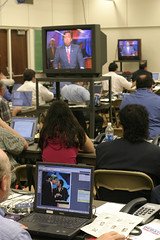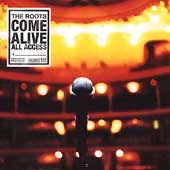We had to be understanding when Gov. Bill Richardson sent his regrets to our Best of Santa Fe Party, held last night (even though he did win second place for Best Politician; US Rep. Tom Udall won first place and his wife, Jill Cooper, stopped by to accept his award). Richardson came to the party last year (as did his security detail), but this year, unfortunately, our party conflicted with his party's big party: opening day at the Democratic National Convention. I'm sure that was a tough call for him (and I'm sure we served better cocktails).
Everybody wants a piece of Richardson, whose weird super-star status continues to bemuse me. I think I first met Richardson when I was about 20 years old, an intern at SFR, and was invited to his Christmas Party held for local journalists (actually, it seems quite unlikely I was invited to that, I probably went as the date/guest of one of the reporters here). Richardson kept bellowing at people to get me drinks (OK, maybe I was actually 21, let's hope so).
Anyhow, these days he's got better things to do than make sure interns are drinking (well, let's hope so) His stature is such that this week, one Boston columnist even refers to him as one of the 'Two Bills,' at the DNC—the other being Bill Clinton—in an article about the fact that
Ordinary People Don't Care About the National Convention
And speaking of interns.
No no no. Let's get a new topic, shall we?
OK, let's stay on Richardson, since he'll be all over the news this week. (And we'll hopefully have several reports in next week's SFR).
Thus far, there's been the
brouhaha over whether Hilary Clinton is speaking on behalf of the DNC
On a more interesting note,
Hispanic participation at the convention is expected to be high; there are 600 Hispanic delegates and some are saying this is the most diverse convention ever held.
Meanwhile Kerry's people are pushing the notion that Kerry is the top choice for Latino voters, 60 percent, they say. Here's the Washington Post article with the info on that!
But before I sign off:
THE NEXT HIP HOP VOTER PROJECT IS FRIDAY, AUGUST 6, 10 PM, THE PARAMOUNT NIGHTCLUB, 331 SANDOVAL STREET IN SANTA FE, NM. HOSTED BY THE NEW VOTERS PROJECT.
BE THERE. REGISTER. VOTE.
WASHINGTON POST
Poll Shows Kerry Leading Among Registered Latinos
Most Reject President's Handling of Economy, War in Iraq
By Richard Morin and Dan Balz
Washington Post Staff Writers
Wednesday, July 21, 2004; 6:46 PM
Democratic Sen. John F. Kerry holds a strong lead over President Bush among the nation's Hispanic voters, with a majority rejecting the president's handling of the economy and saying the war in Iraq was a mistake, according to a survey by The Washington Post, Univision and the Tomas Rivera Policy Institute.
At a time when Bush and Kerry are running roughly even among all registered voters, Kerry enjoys a 2-1 advantage over Bush among registered Latino voters. Hispanics give Bush lower approval ratings than does the overall population, and the poll shows that the bulk of the Latino community continues to identify with the Democratic Party.
The findings suggest that, at this point in the campaign, Bush is falling short of his goal of notably improving on the 35 percent share of the Hispanic vote he received four years ago, although his advisers said they believe he is still on track to do so. Kerry advisers, in contrast, said they are determined to keep Bush from winning as much of the Hispanic vote as he did in 2000.
Bush enjoyed solid Latino backing as governor of Texas, particularly in his 1998 reelection campaign. In the past four years, his political advisers and the Republican National Committee have worked assiduously to court the Hispanic community, which they see as a key not only to the president's reelection this fall but also to the long-term strength of the Republican Party.
There were some signs in the poll that suggest the GOP has begun to make additional inroads among Hispanic voters, but opposition to Bush's policies appear to be an obstacle to more significant growth. A third of all Latino Republicans say they were once Democrats while few Republicans have switched allegiance. And an increasing share of wealthier Hispanics identify with the GOP than in the past.
Competition for Hispanic voters remains fierce. Latinos now outnumber African Americans, rank as the fastest-growing minority group in the country and are less solidly attached to the Democratic Party than are African Americans. The 2000 Census counted more than 35 million Hispanics in the United States, a 50-percent increase in just one decade.
Three-quarters of all Latinos live in high-growth western and southern states and their political influence has grown with their numbers. Although their clout has been muted by low rates of turnout, the number of Hispanics who cast ballots in 2000 represented a 20-percent increase over 1996 and they accounted for about 5 percent of the overall electorate.
The survey of 1,605 registered Latino voters was sponsored by The Post, the Univision Spanish language television network, and the Tomas Rivera Policy Institute (TRPI), an independent think tank affiliated with the University of Southern California.
Hispanic voters in the 11 states with the largest Latino electorates were interviewed by telephone July 6-16. Together, these states are home to nearly nine out of 10 Hispanic voters living in the United States. They include the key battleground states of Florida, New Mexico, and Arizona, where Latino voters may play a decisive role this fall, as well as states such as Texas and California, which have significant Hispanic populations but are not considered competitive.
As with voters nationally, pocketbook issues and national security lead the list of Latino concerns this election year, the survey found. Fully a third -- 33 percent -- rated the economy as their top voting issue. Unlike voters nationally, education came in second among Latinos (18 percent), eclipsing terrorism (15 percent) and the war in Iraq (13 percent.) Nationally, slightly fewer voters name the economy (28 percent) as their top voting issue while slightly more say the war in Iraq (20 percent) or terrorism (19 percent) is most important to them. About one in ten (12 percent) named education.
Latino voters surveyed were sharply critical of the war in Iraq. More than six in 10 -- 63 percent -- said the war was not worth fighting, a view shared by slightly more than half of all voters nationally. Fewer than a third of all Latinos and under half of all voters believe the war justified its costs.
Latinos also are somewhat more pessimistic about the war on terrorism than the overall population, with 37 percent saying the United States is winning and 40 percent saying this country is losing.
The survey found that Kerry claims support from 60 percent of all Latino registered voters in the 11 states surveyed while Bush has 30 percent. Just 2 percent support independent Ralph Nader, with 8 percent undecided. Among all voters nationally, Bush and Kerry were tied in the most recent Post survey, with each receiving 46 percent of the vote.
Matthew Dowd, chief strategist for the Bush-Cheney campaign, said other polls of the overall population show Bush doing far better among Hispanics, including two putting his support around 40 percent. Those surveys included far fewer Hispanics than in the Post-Univision-TRPI poll.
"We got 35 percent in 2000," he said. "If [the election] was held today, we'd get somewhere between 40 and 42 percent. " Paul Rivera, senior political adviser at the Kerry-Edwards campaign, agreed on the significance of how Latinos vote in November. "Our goal is to exceed the Clinton-Gore number from 1996, which was 72 percent," he said, adding that the campaign hopes not only for a record percentage but also a record turnout among Hispanics.
Both campaigns have spent about $1 million each on Spanish-language television ads this year. For Kerry, that represents more than Al Gore spent in all of his 2000 campaign and for Bush it is about half of his 2000 total.
Kerry officials today unveiled a new Spanish-language ad called "faith," in which the candidate promises an immigration plan during his first 100 days in office. The most recent Bush ad aimed at Latinos, called "priorities," began airing about a week ago. The ad criticizes Kerry for missing major votes in the Senate.
Neither campaign, however, is close to its ultimate vote goals, according to the survey. Fewer than half of all Latinos say Kerry is reaching out to them and their community -- and a similar proportion say the same about Bush.
Democrats currently have greater appeal to Hispanics, with half saying they believe Democrats have more concern for their community, compared to 14 percent who cited the Republicans. But on some key measures, Bush is more popular among Latinos than is his party and a majority view him as a likable person.
In the poll, 36 percent of Latinos said they approved of the job Bush is doing as president while 54 percent disapproved. On some specific areas of performance Bush was judged even more harshly. Six in 10 Hispanic voters disapproved of the way Bush was dealing with the economy and the situation in Iraq, while somewhat fewer disapproved of the way Bush was handling immigration issues. They divided over Bush's performance on education.
"Bush is wrong on Iraq," said Maria Cerda, 42, of the Bronx who is from the Dominican Republic and cleans offices for a living. "There are a lot of young people dying over there. Education and better jobs is what we need. Not war."
Cerda sees Bush as a "weak leader -- people are always telling him what to do." Her opinion of Kerry is only slightly better. "He doesn't seem that strong to me, either, but he's better than Bush."
The one area in which Bush received majority support was on his handling of terrorism, where 54 percent of Hispanics said he had been doing a good job. Six in 10 said they believed Bush was a "strong leader," a trait that has been one of the president's strengths nationally.
Yet even on the war on terrorism, these Latino voters said they preferred Kerry to Bush -- by a modest 43 percent to 35 percent ratio. A similar proportion favored Kerry to Bush in dealing with Iraq. By larger margins, the Massachusetts senator was viewed as superior to Bush on the economy, where Kerry had a 25-percentage point advantage, immigration (20 points) and education (24 points).
The Democrat also was viewed as somewhat more caring and, by a smaller margin, better able to handle crises than Bush. On none of the key measures of presidential character or personality was the president judged to be superior to his Democratic challenger, an advantage Kerry holds even though about one in four Latinos said they didn't know enough about him to judge.
"I am with the Democrat Kerry," said Maria Medina, 44, a Mexican-American who lives in Chicago and works as a kitchen manager in the Cook County jail. "The economy is not in good shape. I am disappointed in the way [Bush] is leading the country."
She said she knows little about Kerry. But she voted Democratic four years ago -- her first election as a U.S. citizen -- and likely will do it again. "Democrats understand people with needs. Republicans are for people with no needs."
Slightly more than half -- 53 percent -- said Kerry understood the problems "of people like you," while 37 percent held a similar view of Bush.
A slight majority -- 53 percent -- said Kerry "can be trusted in a crisis" but 47 percent said they trusted Bush. Six in 10 did say Bush had a "likable" personality, but a slightly larger share (69 percent) said Kerry was likable, too.
Latino voters are far from a monolithic voting block. Cuban-Americans have long stood out for their attachment to the Republican Party, and in this survey, fully three in four give President Bush a positive job approval rating, and a similar percentage say they plan to back him in the fall.
They also are twice as likely as Mexican-Americans or Puerto Ricans to say the economy is improving, and four times as likely to base their voting decision on terrorism rather than domestic issues. By a large majority, they support the war in Iraq.
All this could make for another close race in Florida, where Cuban-Americans voted overwhelmingly for Bush in 2000, prompting some community leaders to claim credit for electing Bush president. The survey suggests Cuban-Americans in the Sunshine State once again could provide Bush a major boost, despite his lukewarm ratings nationally, and the poll showed him leading Kerry by a wide margin among Hispanics there.
"I'll probably vote for Bush," said Ricardo Aguilar, 38, a Cuban-American who owns a commercial photography studio in Orlando. While he has reservations about Bush, he views Kerry as a "flip-flopper." Said Aguilar, "He says, 'Life begins at conception, but I'm for abortion. I voted for the war but I don't want to fund it.' Huh? He tells me he's going to make 5 million jobs, but doesn't tell me how."
Assistant polling director Claudia Deane contributed to this report.













